Guifeng Mountain (龟峰), part of the Longhushan-Guifeng Geopark and a component of the world natural heritage site “China Danxia,” is named for its shape, resembling a giant turtle raising its head.
This mountain developed during the late Cretaceous period, approximately 135 million years ago, and is a prime example of a mature Danxia landform, formed primarily through rainwater erosion. The geomorphology is characterized by peak forests, steep cliffs, mesas, stone walls, stone pillars, and stone peaks. The cliff faces feature vertical linear grooves formed by rainwater erosion, with minimal karst development. The micro-landscape and scenic combinations are highlighted by rare Danxia-shaped stone peaks and pillars, preserving the remnants of the youthful Danxia landforms.
Guifeng Mountain boasts 36 peaks, each embodying the qualities of being extraordinary, perilous, spiritual, and delicate. It is famously known as “the rare Guifeng on the river” and “a natural bonsai,” reflecting its unique and picturesque landscape. The park’s distinct geological features and natural beauty make it a notable destination for both geologists and tourists, offering a glimpse into the ancient geological processes that shaped this remarkable terrain.
Table of Contents
- Basic Information
- Location and Transportation
- Map of Guifeng Mountain
- Highlights of Guifeng Mountain
- Vlog about Guifeng Scenic Area
- Other Iconic Attractions in Shangrao
Basic Information
| Estimated Length of Tour | Half a day |
| Ticket Price | 160 RMB including admission, sight-seeing bus, and boating |
| Opening Hours | 7.00 – 17.30 (1st April – 31st October) 7.30 – 17.00 (31st March – 1st November) |
| Telephone Number | 0086-0793-7112400 0086-0793-5842020 |
Location and Transportation
Guifeng Mountain National Forest Park is located on the southern bank of the Xinjiang River in the south of Yiyang County (弋阳), Shangrao City, Jiangxi Province, approximately 60 km east of Shangrao city center. The park lies between Sanqing Mountain, Longhu Mountain, and Wuyi Mountain.
To reach the park, visitors can take a high-speed train to Yiyang Station. Upon arrival, transfer to the Guifeng Tourism Double-Decker Bus at the station exit. The bus ride to the park takes about 40 minutes.
Map of Guifeng Mountain

Highlights of Guifeng Mountain
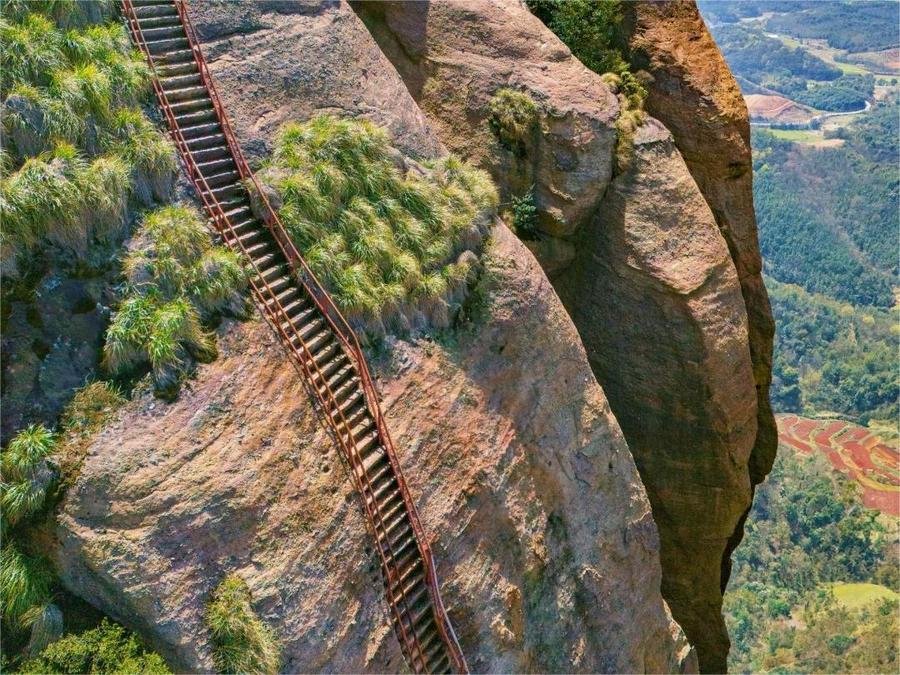
Three-tiered Guifeng
Three-tiered Guifeng stands at an elevation of 77 meters. At its peak, three stones are stacked one on top of the other, resembling a turtle with a distinct head and legs, crouching in a watchful posture. These three turtle-like formations appear to be looking up towards the sky. In the 33rd year of the Ming Dynasty’s Wanli reign (1605), Jiangxi governor Chen Dazhu inscribed the characters “龟峰” on the stone wall of Toad Peak. Each character measures 2.5 feet in length and 1.5 feet in width, written in a seal script style that is robust and powerful.
Double Sword Peak
Located immediately west of Three-tiered Guifeng, Double Sword Peak rises to an elevation of 74 meters. The stone peak emerges sharply from the ground, standing tall and upright like a pair of gleaming swords, exuding an icy aura. Legend has it that these swords were left behind during a fierce battle between the Dragon King of the East Sea and Yang Erlang.
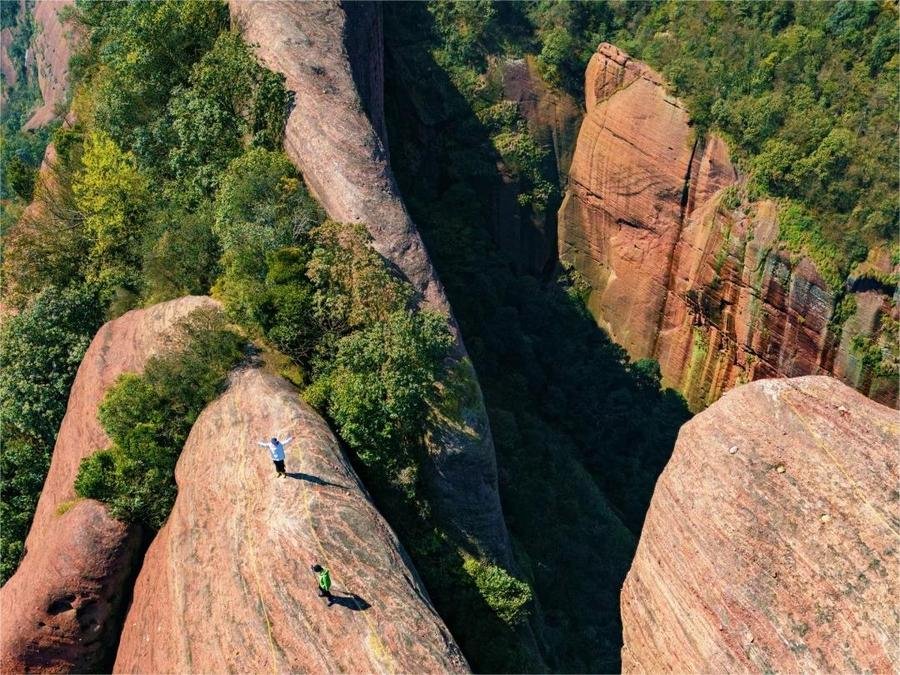
Lion Peak
Lion Peak resembles a lion and changes its appearance based on the viewing angle. From the front, it looks like a colossal seated lion with a furry mane, wide-open mouth, and visible fangs. From the back, it resembles a fierce lion looking backward, with distinct ears, eyes, and mouth, a broad back, and a commanding presence, as if roaring mightily. No matter the angle, the lion’s head seems to follow the observer’s gaze. According to legend, this lion was a great general named Hou Zhen, guarding the palace gate of the East Sea Dragon Palace. During a fierce battle with Yang Erlang, it fell on the battlefield but remained steadfast and imposing. The lion’s body turned into this majestic peak, leaving behind a legacy of loyalty and bravery.
Old Man Peak
Old Man Peak reaches an elevation of 51 meters. It is shaped like an elderly man sitting quietly with a respectful bow. The contours are clear and well-proportioned, with a serene expression and drooping eyes as if in deep thought.
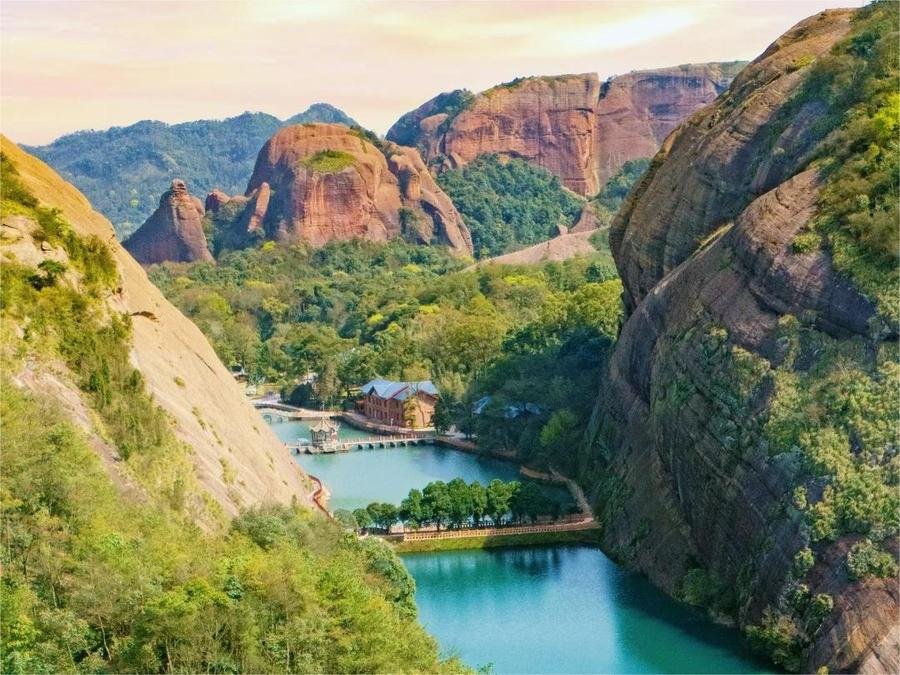
Golden Bell Peak
Golden Bell Peak, at 315 meters, has a dark hue and resembles a hanging golden bell. It can forecast the weather, changing with the wind and clouds. An old saying goes, “When clouds cover Golden Bell Peak, expect either rain or wind.” This is particularly accurate in spring and winter. From its summit, one can get a bird’s-eye view of the entire Guifeng Mountain.
Waiting-for-Husband Peak
Located on the eastern side of Guifeng, Waiting-for-Husband Peak has a touching legend. A young couple, newly married, was separated when the husband was conscripted into the army. His pregnant wife would lean against the mountain wall, looking into the distance, hoping for his safe return. Sadly, he never came back, and she turned into a stone statue, eternally waiting.
Guanyin Peak
Located 200 meters southeast of Guifeng, Guanyin Peak resembles the South Sea Guanyin seated on a lotus throne. The peak’s dignified appearance and kind gaze create a serene atmosphere. When bathed in sunlight, a halo of Buddha light appears; surrounded by white clouds, it looks like drifting gauze; and the misty rain is akin to the dew from Guanyin’s willow branch. Below, a small peak resembles a child kneeling in reverence, creating a picturesque scene of the child worshipping Guanyin.
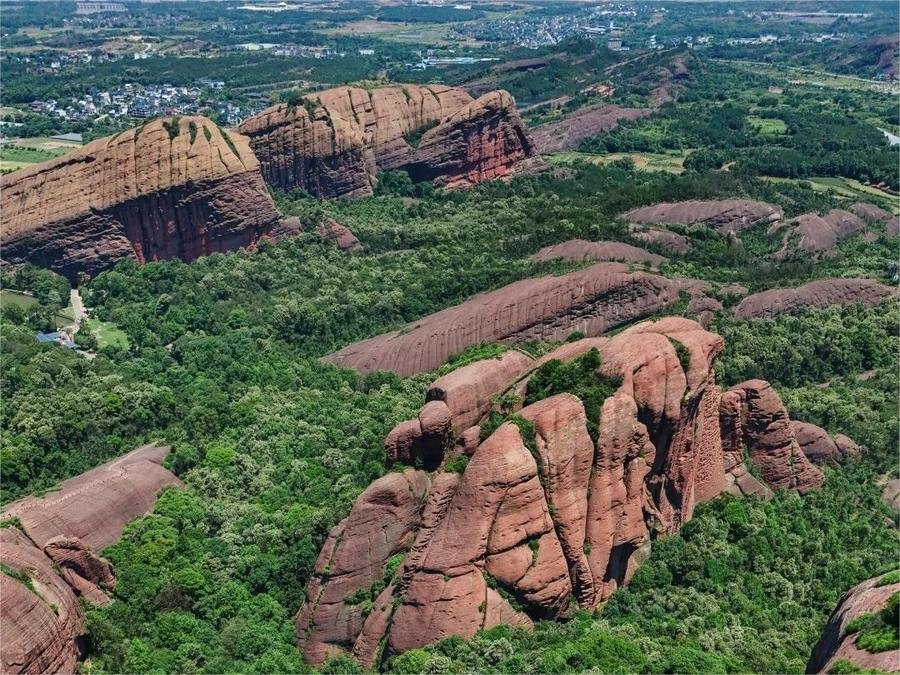
Arhat Peak
Arhat Peak features a cluster of stone peaks that resemble various Arhats. Their postures are diverse, including raised hands, nodding heads, sitting, standing, and squatting, each one vividly realistic.
Lingzhi Peak
Located on the western side of Painting Wall Peak, Lingzhi Peak is often shrouded in mist and resembles a precious lingzhi mushroom. According to legend, the peak suddenly collapsed in the year 1935, the year of the martyrdom of Fang Zhimin.
Painting Wall Peak
Situated above Rain Flower Cliff, Painting Wall Peak features a vertical stone wall about 15,000 square meters in size, with a smooth and even surface. The wall is adorned with remarkable scenes, including jade palaces, sailing ships, diligent farmers, and woodcutters returning with firewood.

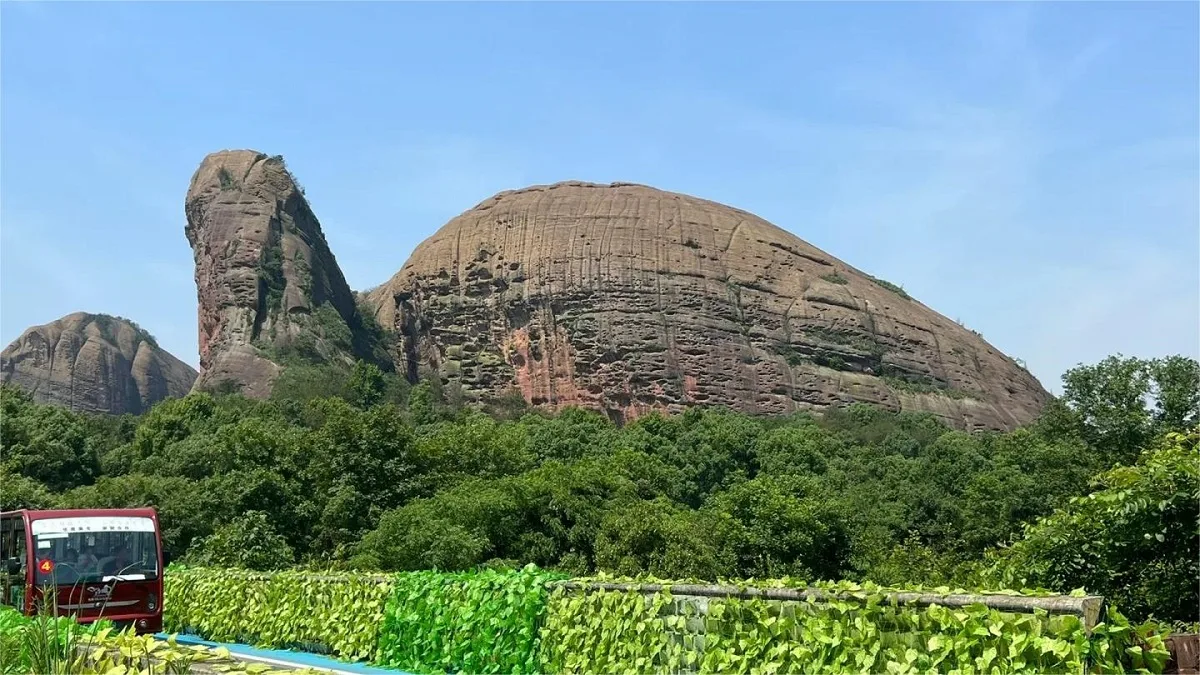



Yiyang Guifeng is surprisingly less crowded and the scenery is unexpectedly beautiful, with plenty of activities to enjoy.
We hiked the entire trail and didn’t take any boats or glass slides. We spent about five to six hours walking. The uphill route follows the blue line shown on the scenic area map.
Make sure to visit Jinzhong Peak (金钟峰) as the views there are absolutely stunning!
I thought that Turtle Peak was very high, but it’s actually quite low. It took me over two and a half hours to climb. It started to rain at first, but then it gradually decreased. There were not many people on Saturday.
The original plan was to visit Sanqing Mountain on the last day. However, I didn’t expect that the scenic area had limited ticket sales, and I couldn’t buy a ticket. So, I changed my itinerary at the last minute to Guifeng in Yiyang. Although it was a weekend and there were still quite a number of people, it felt much more like a remote area. Many spots were really beautiful for photography.
The scenery at Turtle Peak is truly impressive, and it certainly deserves the title of a geological park. However, there are too many issues with the management of the scenic area. The WeChat mini program only allows for the purchase of comprehensive tickets, and single-entry tickets cannot be bought, resulting in long queues. The route planning is also unreasonable; passengers can only take the sightseeing boat by purchasing tickets, and those who don’t have tickets must return the way they… Read more »
During the off-peak season, there were very few people, which made it feel like we had the whole place to ourselves. We took our time exploring and quietly appreciating the surroundings. The mountain wasn’t too high, and it wasn’t difficult to climb. We walked the entire route and took a boat ride, spending over four hours there — it wasn’t too tiring at all.
Some people said that if you take the sightseeing bus, you won’t get to see the “Divine Turtle Welcoming Guests”, so I didn’t buy a bus ticket. However, while walking, I noticed that every bus that passed stopped to allow tourists to take pictures. There was one bus with only one passenger, and that tourist even got off to take photos for quite a while. Since I hiked 15 kilometers back and forth on foot, my whole body is sore… Read more »
The true beauty of the Danxia landform is revealed step by step as you climb the peaks, gradually unveiling the magnificent scenery. For a moment, I couldn’t tell if I was in a city, Mars, or Jurassic Park.